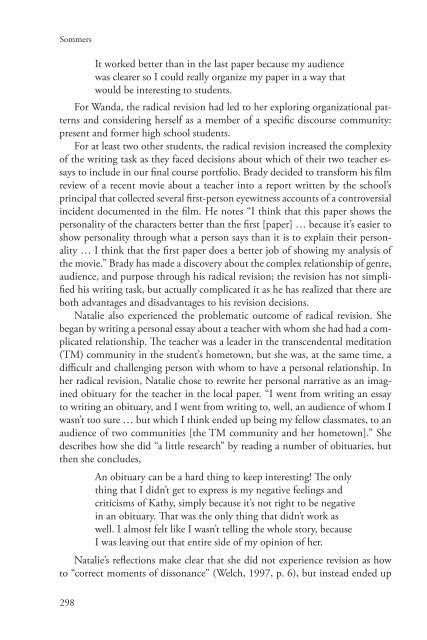Critical Expressivism- Theory and Practice in the Composition Classroom, 2014a
Critical Expressivism- Theory and Practice in the Composition Classroom, 2014a
Critical Expressivism- Theory and Practice in the Composition Classroom, 2014a
Create successful ePaper yourself
Turn your PDF publications into a flip-book with our unique Google optimized e-Paper software.
Sommers<br />
It worked better than <strong>in</strong> <strong>the</strong> last paper because my audience<br />
was clearer so I could really organize my paper <strong>in</strong> a way that<br />
would be <strong>in</strong>terest<strong>in</strong>g to students.<br />
For W<strong>and</strong>a, <strong>the</strong> radical revision had led to her explor<strong>in</strong>g organizational patterns<br />
<strong>and</strong> consider<strong>in</strong>g herself as a member of a specific discourse community:<br />
present <strong>and</strong> former high school students.<br />
For at least two o<strong>the</strong>r students, <strong>the</strong> radical revision <strong>in</strong>creased <strong>the</strong> complexity<br />
of <strong>the</strong> writ<strong>in</strong>g task as <strong>the</strong>y faced decisions about which of <strong>the</strong>ir two teacher essays<br />
to <strong>in</strong>clude <strong>in</strong> our f<strong>in</strong>al course portfolio. Brady decided to transform his film<br />
review of a recent movie about a teacher <strong>in</strong>to a report written by <strong>the</strong> school’s<br />
pr<strong>in</strong>cipal that collected several first-person eyewitness accounts of a controversial<br />
<strong>in</strong>cident documented <strong>in</strong> <strong>the</strong> film. He notes “I th<strong>in</strong>k that this paper shows <strong>the</strong><br />
personality of <strong>the</strong> characters better than <strong>the</strong> first [paper] … because it’s easier to<br />
show personality through what a person says than it is to expla<strong>in</strong> <strong>the</strong>ir personality<br />
… I th<strong>in</strong>k that <strong>the</strong> first paper does a better job of show<strong>in</strong>g my analysis of<br />
<strong>the</strong> movie.” Brady has made a discovery about <strong>the</strong> complex relationship of genre,<br />
audience, <strong>and</strong> purpose through his radical revision; <strong>the</strong> revision has not simplified<br />
his writ<strong>in</strong>g task, but actually complicated it as he has realized that <strong>the</strong>re are<br />
both advantages <strong>and</strong> disadvantages to his revision decisions.<br />
Natalie also experienced <strong>the</strong> problematic outcome of radical revision. She<br />
began by writ<strong>in</strong>g a personal essay about a teacher with whom she had had a complicated<br />
relationship. The teacher was a leader <strong>in</strong> <strong>the</strong> transcendental meditation<br />
(TM) community <strong>in</strong> <strong>the</strong> student’s hometown, but she was, at <strong>the</strong> same time, a<br />
difficult <strong>and</strong> challeng<strong>in</strong>g person with whom to have a personal relationship. In<br />
her radical revision, Natalie chose to rewrite her personal narrative as an imag<strong>in</strong>ed<br />
obituary for <strong>the</strong> teacher <strong>in</strong> <strong>the</strong> local paper. “I went from writ<strong>in</strong>g an essay<br />
to writ<strong>in</strong>g an obituary, <strong>and</strong> I went from writ<strong>in</strong>g to, well, an audience of whom I<br />
wasn’t too sure … but which I th<strong>in</strong>k ended up be<strong>in</strong>g my fellow classmates, to an<br />
audience of two communities [<strong>the</strong> TM community <strong>and</strong> her hometown].” She<br />
describes how she did “a little research” by read<strong>in</strong>g a number of obituaries, but<br />
<strong>the</strong>n she concludes,<br />
An obituary can be a hard th<strong>in</strong>g to keep <strong>in</strong>terest<strong>in</strong>g! The only<br />
th<strong>in</strong>g that I didn’t get to express is my negative feel<strong>in</strong>gs <strong>and</strong><br />
criticisms of Kathy, simply because it’s not right to be negative<br />
<strong>in</strong> an obituary. That was <strong>the</strong> only th<strong>in</strong>g that didn’t work as<br />
well. I almost felt like I wasn’t tell<strong>in</strong>g <strong>the</strong> whole story, because<br />
I was leav<strong>in</strong>g out that entire side of my op<strong>in</strong>ion of her.<br />
Natalie’s reflections make clear that she did not experience revision as how<br />
to “correct moments of dissonance” (Welch, 1997, p. 6), but <strong>in</strong>stead ended up<br />
298


















